2001.10.04 08:38
reenactment and its [un]limits
On 17 February 2000 BC posed the following question to Lauf:
I wonder what the limits of reenactment are... ...where does reenactionary architecture begin and end?
On 18 February 2000 Lauf posted the following reply:
It seems logical that no reenactment occurs without an enactment occurring first... ...reenactment's most inescapable limit is that it can never be as original as that which it reenacts.
I remember feeling thankful to BC for having raised such a succinct question, because it provided the opportunity for me to verbalize what I believe to be an axiomatic aspect of reenactment.
This exchange came to mind when I viewed the "virtual re-creation [via laser light] of the [WTC] towers" as proposed by NY architects Gustavo Bonevardi and John Bennett--here reenactment seems to better describe what the proposal would actually be doing if it was indeed acted upon. This proposal also demonstrates the range of reenactment in that it (the range) comprises multiple degrees of separation from that which is reenacted, with the 'virtual re-creation' here being much removed from the original.
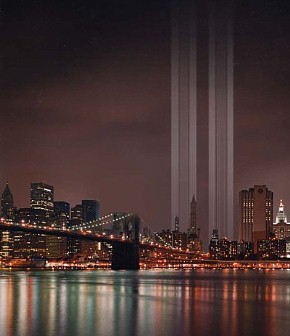
John Bennett, Gustavo Bonevardi, Julian LaVerdiere, and Paul Myoda, Towers of Light, 2001.09.17, Courtesy of Creative Time.
After thinking this through, I then realized that last week's hoax image of the tourist standing atop the World Trade Center just before the plane struck the Tower was also a reenactment, and perhaps even the closest reenactment of the very beginning of the horrible events September 11. Recall how Gregory Wharton very quickly pointed out all the degrees of separation that distanced the reenacting image from the 'original', while JY pointed out all the degrees of the reenacting image that set it close to the 'original'. That this image received national attention perhaps offers a prime example of just how much a reenactment can be real precisely when everyone knows the reenactment really isn't real.
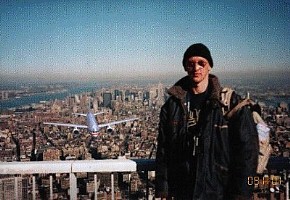
Anonymous, from a camera found onsite, 2001.09.26.
Strange how reenactments can be both real and unreal at the same time.
16100401 Philadelphia 30th Street Station Railyard plans model IQ18/19/22/23/26/27 6151i24
16100402 Philadelphia 30th Street Station Railyard w/Pyramids plans model IQ18/19/22/23/26/27 6151i25
16100403 Philadelphia 30th Street Station Railyard all schemes plans IQ18/19/22/23/26/27 6151i26
16100404 Philadelphia ASouq Neighborhoods plans IQ16 6151i27
16100401 OMA Axel Springer Berlin
18100401 Analogous Museum of Architecture Acropolis of Contemporary Art Altes Box Museum M4NRWF@Franklin Court New Atheneum Museum of Shadows NeuHaus 10 der Künste IQ39 plans elevations 247bi01
19100401 House II wireframe work 2211i05
21100401 Wacko House 002 plans 2285i14
21100402 novel architecturale 1980 House for KFSxhinkel 004 005 006 Museum of Architecture plans 2241i01
21100403 novel architecturale 1979 Clay Workers Co-op Houuse for KFSchinkkel 001 002 003 Wissenschaftzentrum plans image 2243i12
21100404 novel architecturale 1995 Francisville Housing site plan working data 2292i13
| |
2007.10.04 11:06
things to do and see in MUNICH??
The Amalienburg in Nymphenburg Park--a rare manifestation of ultimate Rococo.
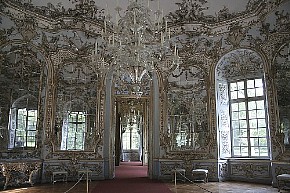
2007.10.04 13:13
Apocalyptic Urbanism
How much of New York City 1807 still exists today? How much of New York City 2007 will still exist in 2207?
2007.10.04 16:18
Apocalyptic Urbanism
Catastrophic urbanism might be a better term, and indeed New Orleans during and post hurricane Katrina provides an ample textbook on the subject. Pockets of civilization may well succumb to catatrophes, but the rest of civilization does just go on. At least that's the situation now, and probably for some time to come. Even the Great Tsunami 2004 had widespread effect, but still on only a small portion of civilization at large.
It's probably more worthwhile to contemplate catastrophic urbanism than to conjecture apocalyptic urbanism.
2009.10.04 11:55
Examples of modern exterior with traditional interior
I was wondering if anyone can point me to some specific examples of built works that have a modern exterior or shell with a traditional/historic interior design. Is there anything out there like Villa Savoye on the outside with like Rococo salons and/or Gothic kitchens and/or Turkish baths on the inside? Maybe Barcelona Pavilion on the outside with Greek temple interior? No hurry. Was just suddenly inspired to ask.
| |
2014.10.04 10:20
Material Witness #5: Cultural Gerrymandering
While O. was writing, I was driving home from a late night viewing of Gone Girl. It was lightly raining and I couldn't remember the last time I drove at night in the rain. Is Gone Girl the same neighborhood as American Beauty 15 years later?
And the night before I was watching August: Osage County--talk about your house with no closets, but lots of skeletons.
Last Monday afternoon, a good bit of a long phone conversation was about the 'obscure' architectural locations of Rome within The Great Beauty, like the apartment within one of the towers of S. Agnes in Agone (which I recognized from a mid-1980s issue of Casa Vogue) and inside the Capitoline Museum at night by candlelight. I forgot to mention the Scala Sancta (which I kind of think was a set rather than the real thing), and have since remembered the Tempietto and the Villa Guilia and Borromini's forced perspective gallery at the Palazzo Spada.
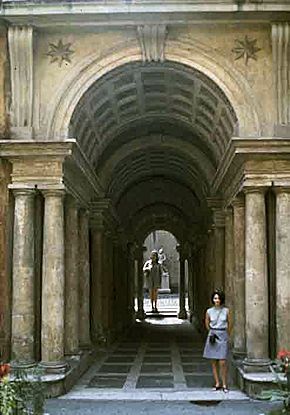
A forced perspective gallery, imagine designing something like that for a palazzo now.
|
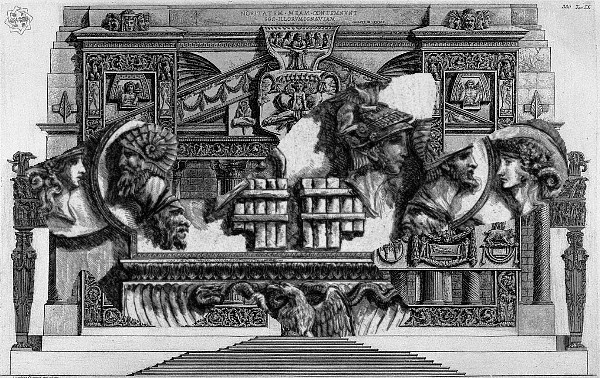 Piranesi's Birthday 2007.04
Piranesi's Birthday 2007.04
2014.10.04 12:45
Sticks and Stones and all that Matter
Agadir is more an offspring of Le Corbusier's Palais des Congres a Strasbourg (1964)--exchange level 3 and the roof of Strasbourg and you get Agadir.
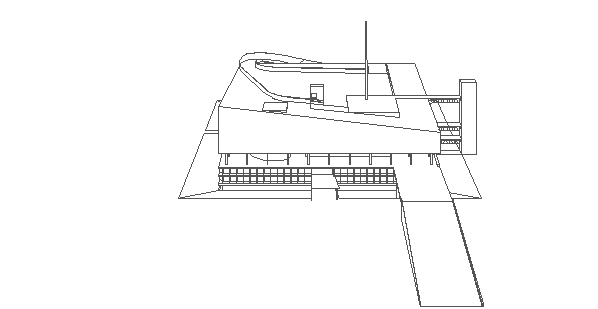
| |
2014.10.04 12:45
I-5 Colonnade Park
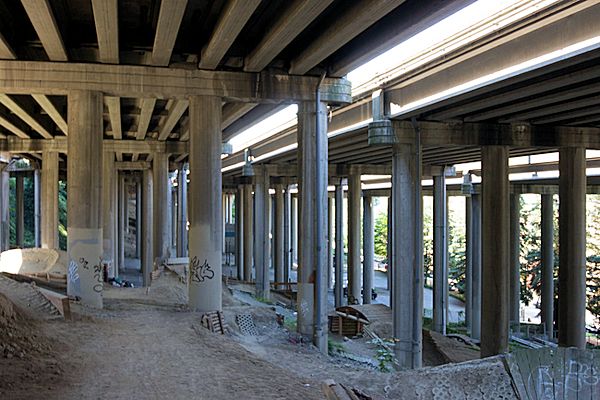
Wonder how the columns of 1-5 Colonnade Park compare to the pylons of Gehry's Eisenhower Memorial for Washington DC.
Also note how similar I-5 Colonnade Park is to the socle of OMA's Agadir Hotel and Convention Center (Agadir, Marruecos, design 1990).
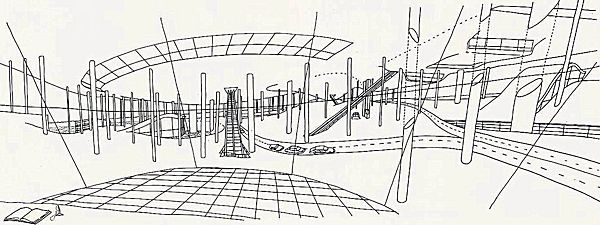 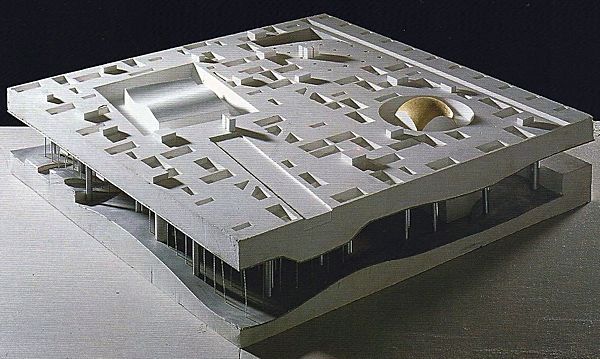 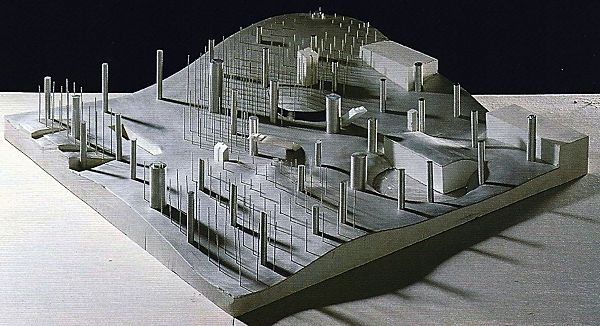
"The landscape which is generated with its concave and convex domes, with the "forest" of columns, its shafts of light, is a modern interpretation of Islamic space--Islam after Einstein relativity--which will also be expressed by materials: polished concrete, mosaic, tiles, etc."
So, is I-5 Colonnade Park also a modern interpretation of Islamic space?
|